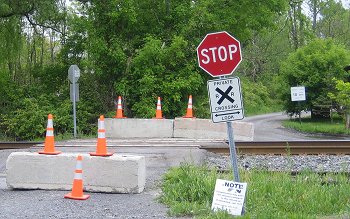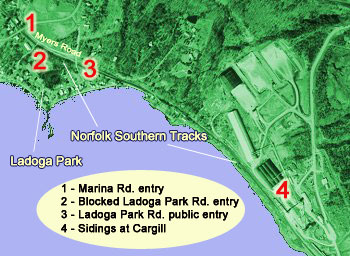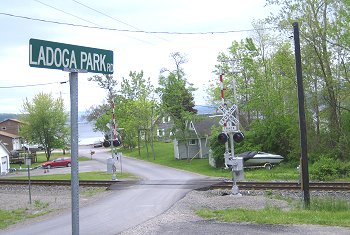- By Dan Veaner
- News
 Print
Print 
David Heck
While Town Board members were willing to do what they can, they seemed pessimistic about how much they can accomplish. "I've had a conversation with the railroad already," Lansing Supervisor Scott Pinney said. "It's a very difficult thing, dealing with the railroad system. It's a big corporation. I am certainly trying."

The western Ladoga Park Road private crossing
Access to Ladoga Park consists of three railroad crossings that connect the neighborhood to Myers Road on the other side of the tracks. Ladoga Park Road is a circle that enters the neighborhood from Myers Road on the east side, then rejoins it on the west side of the neighborhood. A service road connects the western part of that loop with Marina Road, which leads into Myers Park south of the tracks, and crosses the tracks to connect back to Myers Road. The trains that traverse Ladoga Park haul salt from the Cargill mine.

Months ago Norfolk Southern posted signs at the western Ladoga Park Road crossing, the middle of the three, saying 'Compensation may be available for the voluntary forfeiture of rights to this railroad crossing.' It included a telephone number to call. Evidently the railroad did not hear from anyone, because they recently blocked the crossing with concrete barriers. Residents say that at least one neighbor does have rights to cross there included in his deed, and the closed crossing is being challenged.
Lansing resident Skip Hardee says that he called the number posted on the sign repeatedly and nobody answered the phone. "I don't know how many times I called the phone number," he said. "I must have called it 20 or 30 times. There was no answer."
Norfolk Southern media contact Rudy Husband tried the number Wednesday, with the same result. "That's something we're going to have to get fixed," he said. "We'll get that fixed." He called the Lansing Star later that day to report that the number now goes to voicemail after two rings.
Town Attorney Guy Krogh says that towns have the right to condemn a closed crossing by eminent domain for use as a town road. But he said that he wouldn't recommend that except as a last resort, because it means drawn out expenses to taxpayers. He noted that the New York Department of Environmental Concervation (DEC) sued the railroad over infringements at Salt Point and the suit has dragged on for two years so far at the taxpayers' expense. "That's a very lengthy procedure," he said. "Railroads have a lot of resources. In my estimation that would not be an efficient way either time-wise or monetarily to get to the end goal. It's much easier to try to work something out with the railroads."

The eastern Ladoga Park Rd. crossing is the public entrance
to the Ladoga Park neighborhood.
But Husband says that only residents with a legal agreement to cross a private crossing are supposed to use it. "In that area there are five crossings total, four of which are private, which means limited use," he explains. "The other one is a public crossing, which is what everybody should be using. I'm not sure why people are complaining about these other crossings. Unless they have an agreement with Norfolk Southern for those crossings they shouldn't be using them."
He says the middle crossing will be reopened if the resident whose deed cites the right to use it produces the document.
Hardee told the board that when trains block the crossings emergency vehicles can not get to the neighborhood, and with an aging population Ladoga Park is likely to need emergency service. He noted that several residents of Ladoga Park are older and may need emergency care. "It's a safety issue of trains have blocked off one half of the access to Ladoga Park," Hardee said. "I understand that it's their property and their right, but from a safety standpoint it's a huge issue. If there were ever an emergency vehicles would need to get in and get out of there. We're going to have issues.
Husband says there is a procedure for letting emergency vehicles pass. "We would break the train," he says. "We would separate the cars so that the emergency vehicle can go through."
 Heck told the Town Board that in the past trains have brought a string of about 20 empty freight cars, but two weeks ago a train arrived with a double string of 42 cars. He said the same thing happened again the night before last week's Town Board meeting. "They brought a double string of empties up," Heck said. "They blocked all three crossings and the four way crossing into the park for six minutes. They backed up through the switch and pulled forward and blocked it for ten minutes. The train backed up again, pulled forward and blocked it for four minutes."
Heck told the Town Board that in the past trains have brought a string of about 20 empty freight cars, but two weeks ago a train arrived with a double string of 42 cars. He said the same thing happened again the night before last week's Town Board meeting. "They brought a double string of empties up," Heck said. "They blocked all three crossings and the four way crossing into the park for six minutes. They backed up through the switch and pulled forward and blocked it for ten minutes. The train backed up again, pulled forward and blocked it for four minutes."Husband notes that carrying salt by rail helps reduce truck traffic through the town, a problem town officials have been dealing with for some time now. One rail car equals the equivalent of five truckloads, so a 20-car train means 100 fewer trucks driving on Lansing roads. He says that the delays are minimal and critical to serving Cargill.
But New York State Department of Transportation's (DOT) Jennifer Post says that the delays Heck clocked are not minimal. "NY Railroad law restricts obstruction at a highway crossing to a maximum of five minutes," she says. "Section 53c of the NY Railroad Law states, in part, that 'any officer or employee of a railroad corporation' who intentionally obstructs '... any farm or highway crossing with a train... for longer than five consecutive minutes' is punishable by a fine of up to $100 or imprisonment of up to 15 days."
Husband says that when these issues arise it is not hard to find contacts at the railroad when issues arise. He points to the company Web site, which lists press and community contacts, and says that the Norfolk Southern Police whose toll free number is featured at the top of the Web pages will forward concerns to the appropriate departments. Indeed he replied to an email from the Lansing Star 16 minutes after it was sent to the email address listed on the site. Within a few hours he called the Star to discuss the Ladoga Park issues.
It may be inevitable that there will be conflicts between a railroad and the owners of desirable lakefornt properties. "The tracks through Ithaca were first constructed in the 1870s," Husband notes. "You would have thought that in the construction of that community, whoever built it would have taken into account that there were railroad tracks there and perhaps constructed an overpass or an underpass so that this issue could have been avoided."
Town officials say they have dealt with complaints from other lakefront residents. "Yes, we've had complaints about the train idling for hours on end," said Deputy Supervisor Connie Wilcox.
But Husband says that to some extent the complaints are unfair. "This is a very common problem in that people move into properties that are close to railroad tracks or railroad operations, and once they get there they don't like the railroad," he says. "And what are we supposed to do?"
Pinney asked Heck to put his concerns in the form of a letter and promised to call the railroad again when he receives it.
----
v4i21



